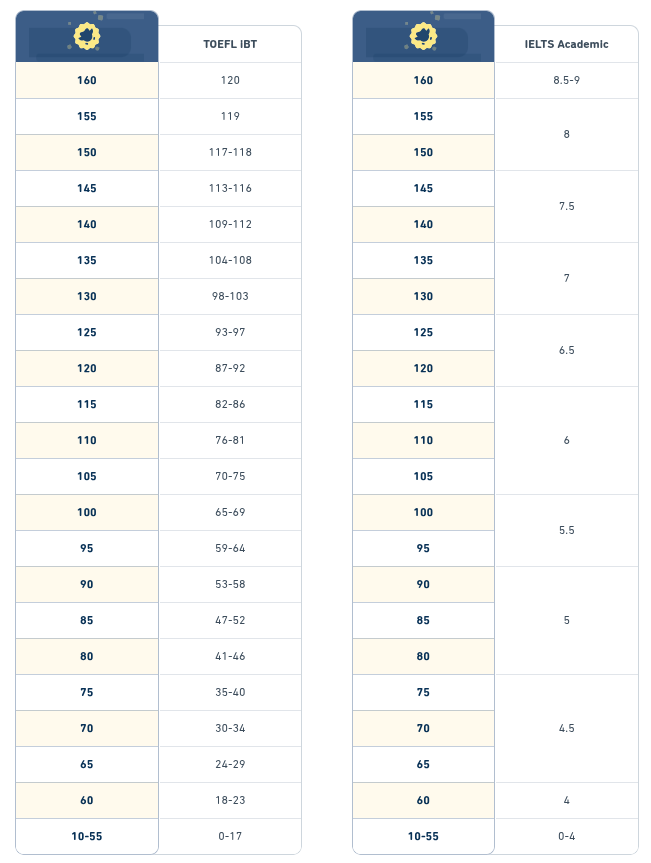Improve Your AP Grades Within One Semester
1. TOEFL
The Test of English as a Foreign Language (TOEFL) is an English proficiency test administered by the Educational Testing Service (ETS) in the U.S.
Test format: The most widely used version today is the TOEFL iBT, which is administered on a computer with internet access.
Test structure: TOEFL evaluates all four English language skills: listening, speaking, reading, and writing. Each section is worth 30 points, for a maximum total score of 120 points. The test duration is 3 hours and 30 minutes, with the following structure:

Test fee: The test fee varies from country to country. To search for your country’s registration fee, go to ets.org.
Minimum score required by U.S. universities: Usually between 70 and 100 points, depending on the institution.
Score reporting: You will receive your scores 4–16 days after the test, depending on your chosen delivery method.
Validity: TOEFL scores are valid for two years. You can retake the test as many times as needed until you achieve your desired score. However, you must wait at least three days between test attempts.
2. IELTS
International English Language Testing System (IELTS) is an international English proficiency test developed by three organizations: the British Council, Cambridge ESOL (University of Cambridge), and IDP Education (Australia).
Test format: There are two versions of the IELTS exam—IELTS Academic and IELTS General Training. To study abroad, you will typically be required to take the IELTS Academic test.
Test structure: IELTS comprehensively assesses all four English skills: listening, speaking, reading, and writing. Each section is scored on a scale from 0 to 9, and your final score is the average of the four individual scores. The total test time is around three hours, with the test structured as follows:

Test fee: $280 – $340, depending on location
Minimum score required by U.S. universities: Typically ranges from 6.0 to 7.5, depending on the institution.
Validity: IELTS scores are valid for two years. You can retake the test as many times as needed to achieve your desired score.
3. DET
Duolingo English Test (DET) is an English proficiency test developed by the popular language learning app Duolingo. For more information about the exam, please refer to Aralia’s Duolingo English Test (DET) article.
Test format: Online, available anytime, anywhere.
Test structure: The DET consists of a 45-minute adaptive online test and a 10-minute video interview. Scores are given on a scale from 10 to 160, with 160 being the highest possible score.
You can refer to score conversion charts to compare DET scores with IELTS and TOEFL iBT scores.

Test fee: $70, with the option for a $118 test bundle (which allows you to take two tests).
Minimum score required by U.S. universities: Around 100 to over 120, depending on the institution. You can look up which universities accept DET scores here.
Validity: DET scores are valid for a period of two years. You can retake the test as many times as you like until you reach your desired score.
Should You Choose TOEFL, IELTS, or DET?
All three of these certificates are widely recognized—not only by universities in the United States, but also by numerous institutions worldwide. Therefore, the choice of test to take depends on your individual needs and preferences. Each test has its unique advantages:
- DET is convenient, affordable, and can be taken at home.
- IELTS and TOEFL are long-established and widely known globally.
It’s also important to check the specific English proficiency test requirements of the universities you’re applying to, as some may accept all three, while others may have a specific preference. This will help you make the best decision for your academic journey.
Enroll in Aralia’s AP Preparation Courses
4. Other English Proficiency Test: PTE Academic
Pearson Test of English (PTE) is an English proficiency test developed by Pearson, a globally renowned education publishing company. Similar to IELTS Academic, PTE Academic is specifically designed to assess English language skills for higher education.
Test format: There are nearly 500 test centers worldwide, and the exam is conducted entirely on a computer.
Test structure: The exam lasts approximately two hours and assesses all four core skills: listening, speaking, reading, and writing. PTE Academic is scored on a scale from 10 to 90, with the total score based on performance across the four main skills and six enabling skills: grammar, spelling, oral fluency, pronunciation, vocabulary, and written discourse. The test is divided into three parts:
- Part 1 – Speaking and Writing: 54–67 minutes
- Part 2 – Reading: 30 minutes
Part 3 – Listening: 30 minutes
Test fee: $185
Minimum score required by U.S. universities: You typically need to score between 55 and 65 or higher, depending on each university’s specific requirements.
Score reporting: Scores are typically available within two days after completing the exam.
Validity: PTE Academic scores are valid for two years.
5. Cambridge English: C1 Advanced or C2 Proficiency
The Cambridge English Qualifications are a series of English language proficiency exams developed by the prestigious University of Cambridge. These exams are widely used worldwide to assess English language skills for students and professionals at various levels.
The Cambridge English exams evaluate language proficiency using the Common European Framework of Reference for Languages (CEFR).
CEFR is divided into three levels: A, B, and C, where A is the basic level and C represents proficient users. Each level is divided into two sublevels (e.g., B1 and B2, C1 and C2). The C1 Advanced and C2 Proficiency exams are among the highest levels and are widely accepted by international universities.
Test format: You can choose between paper-based and computer-based testing formats.
C1 Advanced Test Structure: C1 is the fifth level of six in the Cambridge English Qualification framework. Achieving the C1 level indicates you can use English fluently and effectively in academic and professional settings. It demonstrates that you are capable of participating in English-taught university courses.
The exam lasts four hours and includes four sections assessing the main language skills: listening, speaking, reading, and writing. You can view detailed information for each section on the official Cambridge website.

C2 Proficiency Test Structure: C2 is the highest level in the Cambridge English assessment system. It reflects an exceptional command of English, indicating the test taker can master complex language tasks and possesses an estimated vocabulary of around 16,000 words.
Like the C1 exam, the C2 test lasts four hours and covers listening, speaking, reading, and writing. Detailed information about each section is available on the official Cambridge platform.
Test fee: Varies by location and test center, typically ranging from $180 to $250.

6. iTEP
The International Test of English Proficiency (iTEP) is an internationally standardized English language proficiency test commonly used in academic and professional environments. Among its versions, iTEP Academic is designed for students who intend to study at international universities.
Test format: The test can be taken online or in person at authorized testing centers.
Test structure: The exam lasts approximately 80 minutes and assesses five skills: listening, speaking, reading, writing, and grammar. Each section is scored on a scale from 0 to 6.0.

| Skill | Content Assessed |
| Listening | Listening to conversations/academic discussions |
| Speaking | Responding verbally to short questions |
| Reading | Reading and answering related comprehension questions |
| Writing | Writing a paragraph based on a given topic |
| Grammar | Testing grammar in specific contexts |
Test fee: $129
Minimum score requirements for U.S. universities: Varies by institution, generally ranges from 3.8 to 4.5.
Validity: The certificate is valid for two years. You can retake the test as many times as you want to improve your score.
Purpose of English Proficiency Tests in U.S. College Admissions
Standardized tests, particularly English language proficiency exams such as the IELTS, TOEFL, and DET, play a crucial role in the college application process, especially for international students.
The primary goal of requiring these certifications is to assess a student’s academic English proficiency. Universities want to ensure that international applicants can:
- Understand and process academic materials in English;
- Participate in discussions, group projects, and clearly express their ideas in English;
- Write essays and complete assignments or exams in English at the college level.
As a result, more academically rigorous universities tend to require higher English proficiency scores. On the other hand, some institutions may be more flexible with their score requirements or accept a wider range of certifications, provided the student can demonstrate sufficient English proficiency.










